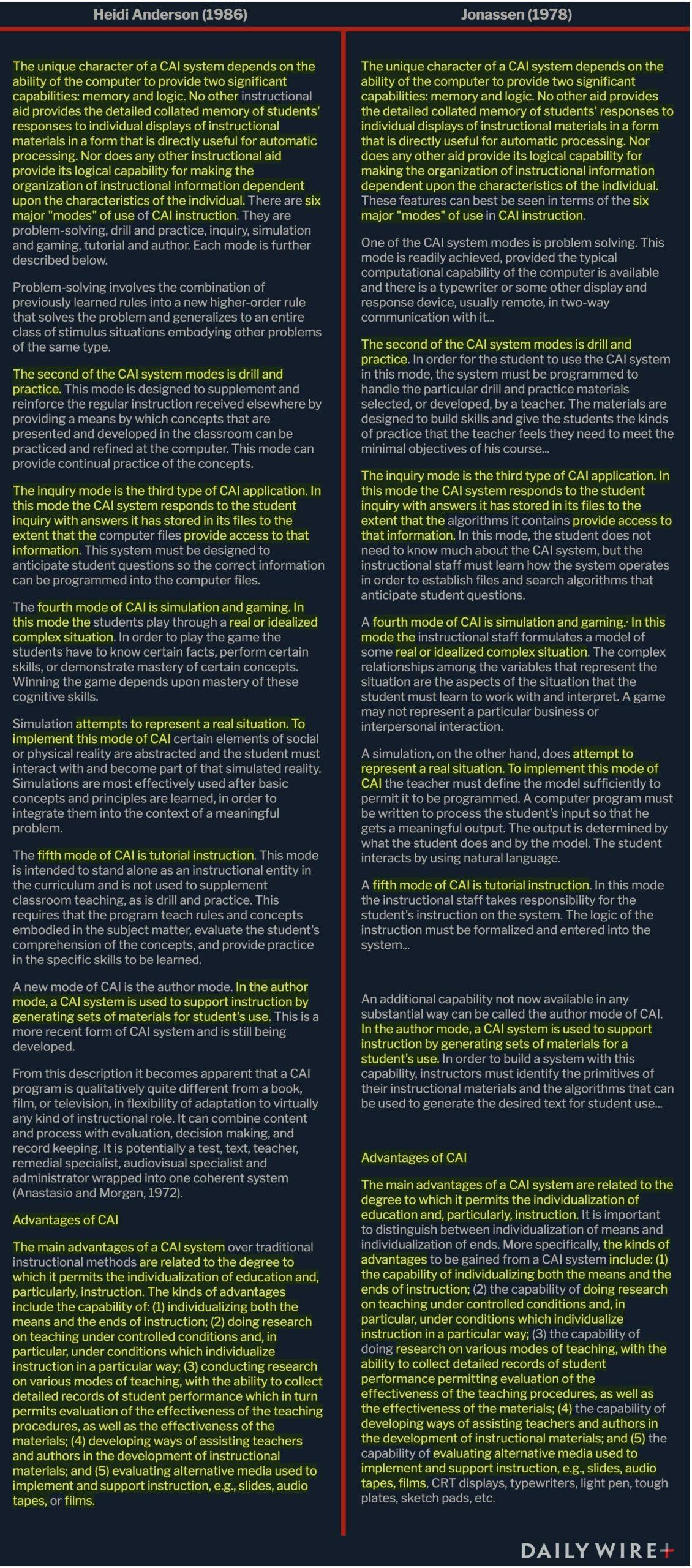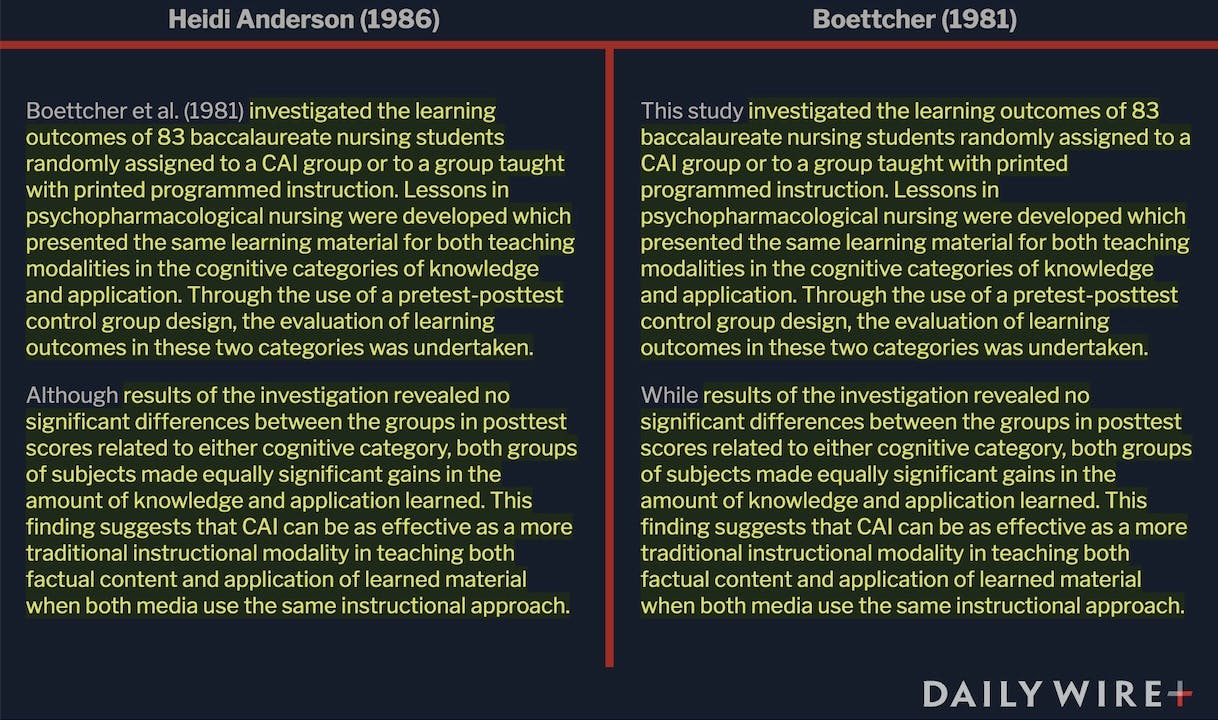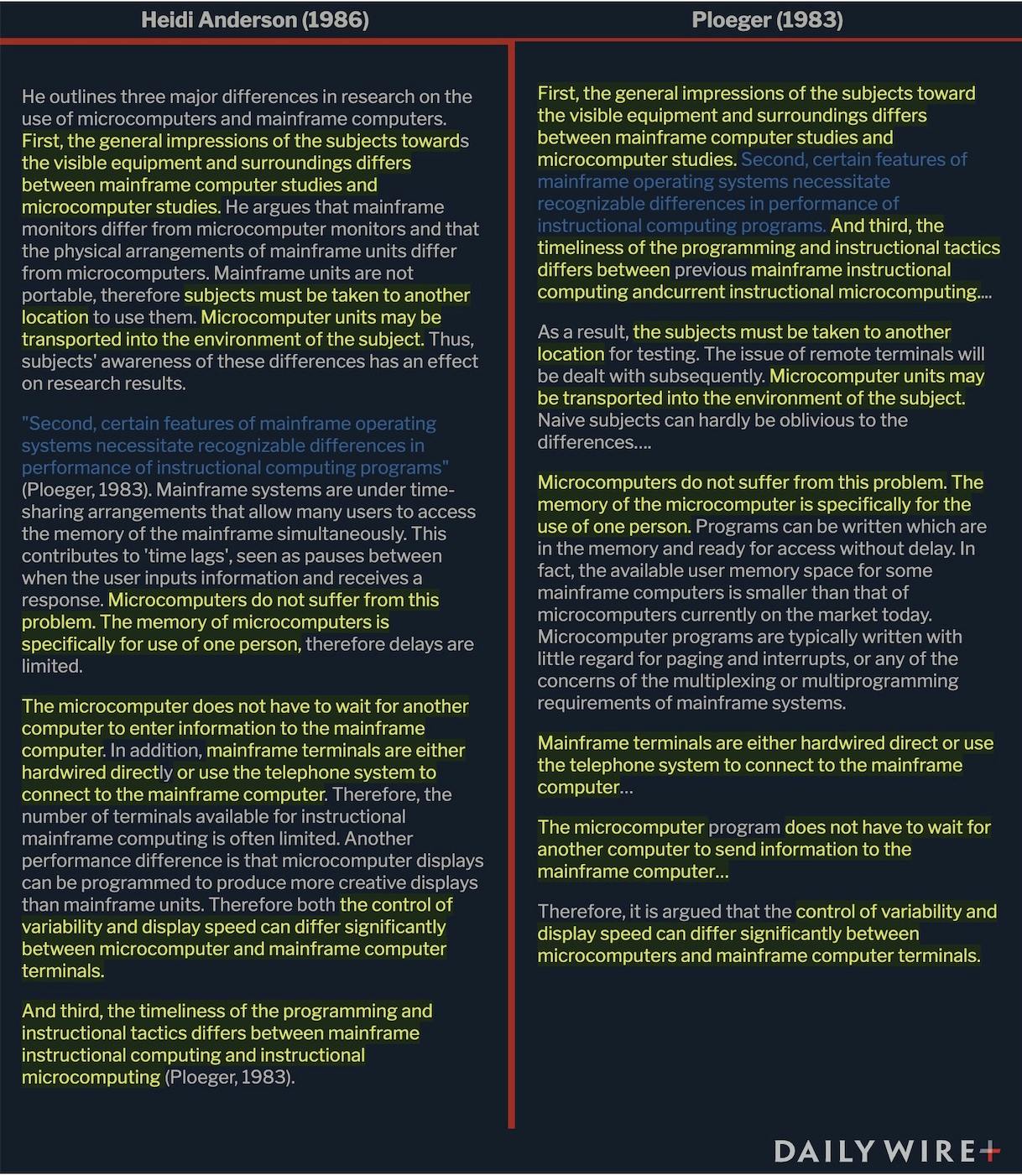A college president and former chair of the American Association of State Colleges and Universities plagiarized extensively in her doctoral dissertation, a Daily Wire review found.
Heidi M. Anderson is president of the University of Maryland Eastern Shore. For nearly four decades, she has climbed the academic ladder while producing an unremarkable amount of low-quality research.
Now, a lawsuit from a former Eastern Shore professor threatens to cast Anderson’s career in a startling new light. Donna Satterlee alleges that, under Anderson, low-skilled black faculty were hired based on their race and paid more than white faculty. The suit said whites were forced to do the work that black officials took credit for.
A Daily Wire review suggested that it could be a pattern that began with her 1986 doctoral dissertation for Purdue University, which kicked off her academic career.
Portions of the dissertation, which deal with the use of computers in pharmaceutical education, appear to be a repurposed and uncredited copy of a 1984 paper by Donna E. Larson, a professor of nursing, about the use of computers in nursing education, with simply the name of the field changed. The photos below show just the beginning of a lengthy section where Anderson appears to crib Larson’s eight points.

Note at the bottom that Larson cited a number of papers, including her own prior work. Anderson appeared to lift those citations, in order, but remove Larson’s citation to herself–perhaps to avoid leaving a clue that could unravel an academic crime. Larson’s name is not mentioned anywhere in Anderson’s dissertation.
Larson’s list had eight items on it, but Anderson had 12. The 10th item on the list also copied someone else’s words verbatim and without quotation marks to make a simple point.
When Anderson summarizes a book by Christopher Evans, she is actually copying someone else’s summary of Evans’s work, even though there is no parenthetical attribution in that section of the text indicating it. The summary on the right, by Richard E. Pogue, was from the introduction to the same journal issue where Larson’s paper appeared.

Likewise, Anderson appears to have simply taken the language of University of Texas medical professor Robert M. Caldwell, writing about computers in medical schools, and changed the name of the field. Caldwell does not appear in the references section of that chapter.

A significant stretch of Anderson’s paper is identical to “Introduction to Instructional Media” (1978) by David H. Jonassen, even though Jonassen’s name never appears in her paper. That includes mirroring Jonassen’s language that something was “recent” in the world of computers, without the reader knowing that it was actually new almost a decade prior.

Anderson’s personal touches consisted of adding woke language and grammatical errors. For example, a 1,000-word stretch appears copied directly from a paper by Robert M. Caldwell (1984) and an introduction to another paper by Christopher R. Brigham and Martin Kamp in 1973. The primary difference is that Anderson changed “his” to “his/her,” and the correctly-spelled “judgment” to the incorrect “judgement.”

Anderson’s paper proposed using computers to administer quizzes to pharmacy students, but she cribbed information about computers from papers that were woefully out of date even in 1986. One sentence said “Review of the literature demonstrates that there are relatively few methodologically sound evaluations of the effectiveness of computer assisted instruction (Atkinson, 1968).”
By the time of her writing, Apple II computers were widely available, and the sort of interactive tests her paper focused on were technically trivial. Yet with her experience with computers seemingly consisting only of reading old papers about them, her paper went on at length about topics like the comparative advantages of mainframes versus terminals. She copied older scholars’ exact language even when explaining such obvious concepts as why it’s better for a computer to be small than big (“microcomputer units may be transported into the environment of the subject”).
The portion of Anderson’s dissertation designed to drive the field forward consisted of showing a computer program to students and then asking them questions about their opinions about computers. But the interactive activity was programmed by someone else, and the questions were also written by another researcher.
Startlingly, the conclusion of her original research also appeared to be copied from someone else. “These findings suggest that CAI can be as effective and efficient as a more traditional instructional modality in teaching both factual content and application of learned material when both methods use the same instructional content,” she wrote. That was virtually identical to a sentence that Elaine G. Boettcher wrote five years prior.

Anderson’s dissertation says that “financial assistance was provided to the author by the Purdue University Black Doctoral Fellowship.”
‘Posture towards non-Black faculty and staff was barely concealed hostility.’
In July, Satterlee sued the University of Maryland Eastern Shore and Anderson, saying, “Black faculty and administrators are paid vastly higher than others of similar or better qualifications. Heidi Anderson has instituted a two-tier system of racial preferences discriminating against White and Asian faculty who are given more and less-desirable work but significantly lower pay.”
“The Heidi Anderson Administration’s posture towards non-Black faculty and staff was barely concealed hostility. It was an established practice to pay non-Blacks less than Blacks, not include them in valuable opportunities, and only exploit their work for personal gain of the select few who were close to the university administration,” the federal lawsuit said.
“Moses Kairo, a former Kenyan national, became the dean of the School of Agricultural and Natural Sciences at UMES in 2012. He exhibited a distinct preference for African nationals in hiring for positions within the school,” the lawsuit said. Another Kenyan and apparent former schoolmate of Kairo’s, Grace Namwamba, was hired as department chair and Satterlee’s boss, even though “Namwamba had extremely poor work competencies and skills and appeared incapable of writing in English at the level required of a university professor,” it said.
Satterlee, the lowest-paid faculty member in her department, “was assigned double the work of African or African-American faculty. In one instance, Dr. Satterlee was instructed by Dr. Namwamba to create a master’s degree program in two days… after Dr. Satterlee worked without rest to complete the assignment, Dr. Namwamba took her work product and stole the credit,” the suit said.
Satterlee said she earned the ire of Anderson and Namwamba after she called for a salary study that would publish faculty pay broken down by race, and by correcting sloppy work by Namwamba in an attempt to save the department from embarrassment. She was the only faculty member to be denied a request for a promotion that year, she said — with the denial letter misspelling her name as “Dr. Scatterlee.”
She said she was disciplined by the school’s DEI office, called the Office of Institutional Equity. The office is led by Jason Casares, who was hired after resigning from his job at a different university amid allegations that he sexually assaulted a college administrator. Casares’ claim was that Satterlee had “bullied” her boss.
He also accused her of insubordination, to which Satterlee replied: “If a written communication from a department chair is ‘riddled with grammatical errors and misspellings’, I have an obligation to call that to her attention and may do so without fear of reprisal, because, ultimately, we seek to teach students how to communicate.”
She was placed on “Transitional Terminal Leave.” The lawsuit said the Office of Institutional Equity has no authority to terminate the employment of a tenured professor, and that “insubordination” is not grounds for any university office to terminate a tenured professor.
The lawsuit also said that the University of Maryland Eastern Shore has declined sharply under Anderson’s leadership, losing the prized R2 research designation.
The university is required to submit a response to the lawsuit by October 10.
Anderson declined to comment for this story. After publication, she put out a public statement saying “Recent allegations of plagiarism have been raised regarding my 1986 doctoral dissertation. Integrity, accountability, and trust are the foundations of my leadership and I take these concerns with the utmost seriousness. Consistent with University System of Maryland policy, there will be an assessment of these allegations… I am deeply grateful for the support of the UMES family during this period.”
Anderson’s published research in the decades since defending her dissertation has been short and of low quality, often published in obscure journals. For one paper, she had students ask 89 people who was their “primary source of prescription medicine information.” Most said their doctors, so she concluded that “pharmacists should consider providing more information.”
In another, she claimed that an unnamed minority faculty member had students repeatedly subject her to racial slurs in class and over the phone, and that this research discovered that colleges should create a “grievance process” for “student-faculty conflicts.”
Anderson repeatedly attained high academic positions. “I was the first African American to serve as President [of] the Accreditation Council on Pharmaceutical Education, the national accrediting body,” she testified to Congress in 2021, and “The Chronicle of Higher Education also recognized UMES as having the second most diverse faculty.”
“Allow me to say, that because we launched this program during the COVID pandemic, our efforts were not as robust or as smooth as it [sic] otherwise might have been,” she acknowledged to lawmakers in written remarks about her school’s use of federal funds. “One of the important issues we face as a nation and world are [sic] the challenges brought about by climate change.”
She told Congress that the university, which is both a historically black college and an agricultural college, would focus on “creating safe spaces where farmers can meet monthly.”
In 2023, Anderson served as president of the American Association of State Colleges and Universities, making her the face of public universities.
Satterlee, the professor who was forced out, said that Anderson’s alleged pattern of forcing white professors to do the work, while black faculty take credit, mirrors the apparent deception that began her academic career.
“Heidi’s PhD has been obtained by fraud and by her passing off the work of other scholars as her own work. How can a university tell its students to be honest if its president is herself dishonest?” she told The Daily Wire. She called on Jay Perman, chancellor of the University System of Maryland, to fire Anderson.
Michael Sandler, a spokesman for the University System of Maryland, told The Daily Wire: “We are aware of the allegations raised against President Anderson and are reviewing them with our policies. We will determine the next steps once that process is complete.”
In September 2024, The Daily Wire revealed that a 5,000-word paper on rocket science by Darryll Pines, the president of the Maryland’s flagship campus at College Park, copied a 1,500 word stretch from a tutorial website by an Australian student. The paper, by Pines and a co-author, did not mention or cite the student anywhere, and attempted to change his British spellings to American ones–potentially a telltale sign that Pines knew he had not written the material, and was attempting to deceive readers.
In response, Pines wrote that “I acknowledge recurrent language,” and said an investigation would begin. Perman’s office said the review would be conducted jointly by the College Park campus and the statewide system, and “the two parties will use an expert consultant at an external law firm to lead the review… the consultant will determine who will serve on the review panel.”
A month later, the Australian student, who said it was “clearly plagiarism…not worthy of an academic,” said the panel hadn’t contacted him. More than a year later, that panel has said nothing publicly, and Perman’s office has declined to share updates.
“It just feels like something weird is going on,” Professor Nick Seybert told the Baltimore Banner in July. “It doesn’t feel like they’re taking it very seriously.”


This story has been updated with a statement from Anderson.

.png)
.png)

